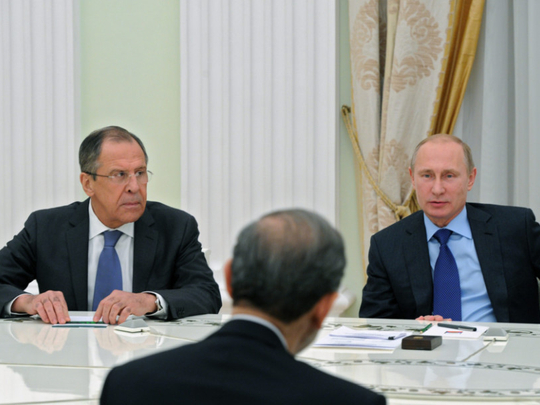
Last week, Russian Defence Minister Sergey Shoygu made a highly visible visit to Tehran, during which, he signed a military and security cooperation agreement with his Iranian counterpart Hussain Dehghan. The scope of the agreement covers a broad range of issues, including joint military exercises; cooperation on regional and global security; and combatting “terrorism, extremism and separatist tendencies”, Iran’s state news agency Irna stated. Some media reports spoke about Russia agreeing to supply Iran with the previously withheld S-300 missile batteries as well as upgrading Iran’s MiG-29 and Sukhoi-24 aircraft; and supplying the more modern Sukhoi-30 fighter jets.
The signing of the agreement came at a time when both countries face tremendous western pressure — Iran over its nuclear programme and Russia as a result of the Ukraine crisis. Yet, a history of mutual suspicion and mistrust renders any attempt to develop the relationship between the two countries into a strategic alliance extremely difficult. For decades, the Russians have used their ties with Iran as a bargaining chip in their complex relationship with the West. Russia has, in fact, voted in support of all United Nations Security Council resolutions concerning Tehran’s nuclear programme, including resolutions 1737 (2006), 1747 (2007), 1803 (2008) and 1929 (2010).
Additionally, Iranian-Russian relations have soured on numerous occasions. In 2010, Moscow refused to honour a deal to supply Iran with the S-300 defensive missile system, despite Iran paying the $800 million (Dh2.94 billion) price, prompting Iran to resort to the Paris-based International Court of Arbitration for redressal and seek $4 billion in damages from the Russians. Russia has for long also refused to provide maintenance services for Iran’s fleet of submarines, which would have given it increased operational manoeuvrability in the Gulf and the Indian Ocean. Moscow dragged its feet over the construction and operation of the Bushehr nuclear reactor, using it as a pawn in dealings with the West. This is yet another side to a long history of disappointment and mutual mistrust.
For its part, Russia has had its own misgivings about Iranian policies, particularly when it comes to Iran’s attempts to possess nuclear technology. At last year’s Moscow Non-Proliferation Conference, the Russian position was closer to that of the West than Iran’s. There is also a widespread belief amongst Russian officials that Iran will not hesitate to ditch them the moment its relations with the West, particularly with the US, are repaired. It is no secret that Russia was kept in the dark over the secret negotiations between Iran and the US, mediated and hosted by Oman in 2013, paving the way for the Geneva Interim Agreement on the Iranian Nuclear Programme. These talks form part of a growing trend towards Iranian-American bilateral negotiations that sit outside the framework of the P5+1 (US, Britain, France, Russia, China + Germany) talks — a trend that Russia is anxious about. Moscow must also be worried about Iran’s ambitions to become a main supplier of energy to Europe, knowing fully well that energy supplies are a major incentive for the West to arrive at a resolution for the Iranian nuclear issue.
Yet, despite this legacy of mistrust, the US has, to an extent, succeeded in driving Russia and Iran closer together. Punitive measures against Russia, explicitly mentioned in US President Barack Obama’s 2015 State of the Union address, paved the way for greater Russian-Iranian cooperation at a time of increased mutual interests between the two countries in the Middle East. Ruslan Pukhov, director of the Moscow-based Centre for Strategic Analysis, best sums up the motives underlying the two countries’ broadening coordination: Iran and Russia are both adversely affected by falling oil prices; and while the situation in Ukraine has created tensions for Russia in Europe, Iran faces tensions in the Middle East and both countries are subject to western sanctions.
In Syria, Russia and Iran have openly coordinated their support for the regime of President Bashar Al Assad, each for its own aims. The rise of Daesh (Islamic State of Iraq and the Levant) and its control of wide swathes of Iraq and Syria by last summer, led to the bolstering of Iranian-Russian interests in the region, prompted by the mutual fear of the rise and expansion of extremist groups and the inherent threat to their own regional policies and national interests. The US withdrawal from Afghanistan is also playing a key role in the increased Iran-Russia cooperation.
Yet, since America is the single most important factor leading to the new Tehran-Moscow honeymoon, any shift in US policy towards either country will automatically lead to a breaking up of this relationship. The first test will indeed be the talks over Iran’s nuclear programme.
Dr Marwan Kabalan is a Syrian academic and writer.








